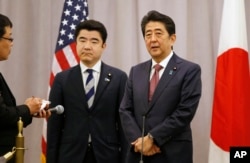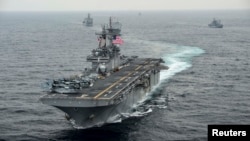As a presidential candidate in 1976, Jimmy Carter promised to withdraw all U.S. ground forces from South Korea, arguing the troops were inflammatory and risked drawing Washington into war. After he was elected, Carter attempted a troop pullout, but was never able to completely follow through on his promise. Four decades later, nearly 30,000 U.S. troops remain stationed on the peninsula.
During his own run for the presidency, former U.S. President Ronald Reagan made big promises about restoring formal diplomatic relations with Taiwan, a move that would have angered Communist China, the island's powerful rival on the mainland. Reagan, too, never followed through, instead preserving Washington's unofficial relationship with Taiwan, a state of informal ties that still exists to this day.
Both are examples of eyebrow-raising proposals, made during the heat of the presidential campaign, that would have significantly altered U.S. policy in Asia. That they were never carried out suggests President-elect Donald Trump may also face serious challenges should he choose to follow through with his own bold Asia proposals, says Ralph Cossa with the Center for Strategic and International Studies.
"In any presidential campaign, about half of anything the candidates say is not going to happen. The challenge is figuring out which half," Cossa told VOA. "I think we're doing a candidate a disservice when we focus too much on the exaggerated version of what they said. My assumption is that things are going to be the same until someone really convinces me they're intent on changing it and are capable of changing it."
Exaggerated rhetoric?
But Trump's statements on Asia seem to go well beyond the kind of exaggerated rhetoric and outsized promises sometimes used by U.S. presidential candidates. And many of those statements were like on the mind of both Trump and and Japanese Prime Minister Shinzo Abe, when both leaders met at Trump's residence in New York late Thursday afternoon during the president-elect's first meeting with a foreign leader since being elected.
Here is a sample of some of the controversial comments the billionaire businessman has made on Asia:
- Trump has repeatedly suggested the U.S. could withdraw troops from Japan and South Korea unless both countries pay their "fair share" of the cost of the deployments (Seoul and Tokyo currently pay about half the cost of U.S. forces). He's said both countries should instead protect themselves, without U.S. help and possibly with the help of nuclear weapons. If the U.S. troop pullout resulted in a war between Japan and North Korea, Trump responded glibly in April: "Good luck. Enjoy yourself, folks."
- Trump has also talked big on China. He's promised to place a 45 percent tariff on all Chinese exports to the U.S., a move many worry could spark a trade war. He vowed to label China a currency manipulator. And he opposes the Trans-Pacific Partnership, the free-trade deal at the heart of the White House's effort to focus U.S. military and economic policy toward Asia.
- On North Korea, one of the region's most intractable problems, Trump has put out an inconsistent message, saying he is both open to negotiating with the country's unpredictable young leader, Kim Jong Un, and that he is also open to having China assassinate him.
Trump unique
It's those kinds of comments that have many longtime Asia watchers concerned that Trump's views represent a fundamental change in the direction of U.S. policies in Asia, which for decades have been backed by bipartisan support.
"What I'm hearing this time from Trump is that it's very zero-sum, very divorced from an apparent appreciation for these wider benefits of the alliance relationship" with various countries, says James Schoff, a senior associate in the Asia Program at the Carnegie Endowment for International Peace.
Whereas many presidential candidates have proposed major changes in Asia strategy, most have done so while reassuring U.S. allies that Washington "doesn't want to tip over the whole apple cart of the post-World War Two global international order," Schoff says.
"Putting these proposals in the context of 'America First' is very different," he adds, referring to Trump's self-described foreign policy approach.
Katsuyuki Kawai, an adviser to Abe who was sent to set up the Abe-Trump meeting, said several advisers to the president-elect told him "we don’t have to take each word that Mr. Trump said publicly literally."
Asia leaders waiting
Many leaders in Asia appear to be taking a wait-and-see approach to Trump.
At an event Wednesday in Washington, Vietnam's ambassador to the U.S., Pham Quang Vinh, was reluctant to comment on the policies of the incoming Trump administration. "I'm not assumed to judge on something that is not in place yet," he said at an event held at the Center for National Interest.
But he was optimistic that the U.S. relationship with Vietnam and the region would continue largely unchanged.
"Asia continues to be important for the U.S., and Asia wants the U.S. to be in the region. And the next administration should continue to sustain its engagement with the region," Vinh said.
That's a positivity shared by Cossa, the Hawaii-based analyst. In his estimation, U.S. policy in Asia will "most likely continue to go in the same direction," he says, before stopping himself and adding: "I think. And I hope."











